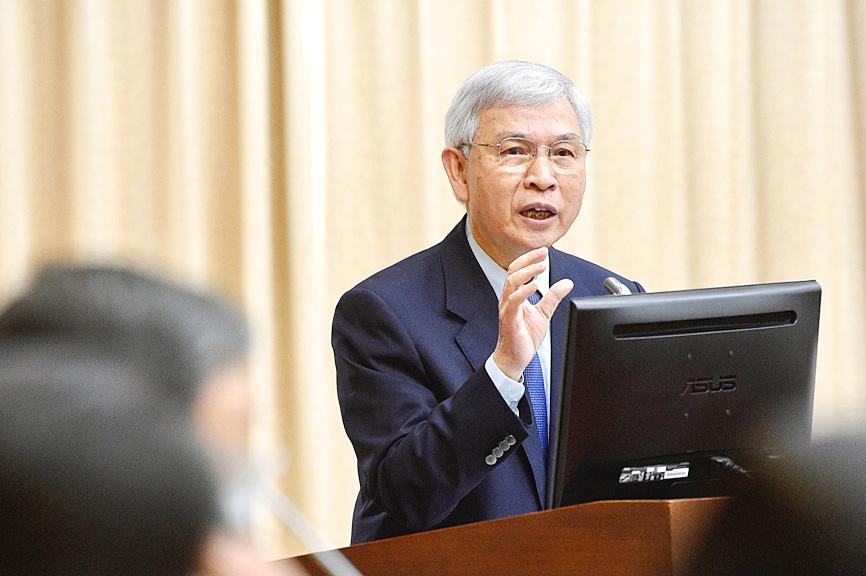Central bank Governor Yang Chin-long (楊金龍) yesterday declined to commit to an interest rate freeze for the next two years, unlike the bank’s major global peers, saying the bank has to factor in inflation risks and other economic data when setting policy.
Yang’s remarks came as inflationary pressures build up around the world amid an improving global economy and continued monetary easing.
“The central bank has no intention of raising interest rates for the time being, but cannot promise to maintain the same policy stance for the next two years,” Yang told a meeting of the legislature’s Finance Committee in Taipei.

Photo: George Tsorng, Taipei Times
The central bank would consider interest rate hikes if inflation becomes uncontrollable, Yang said, adding that related readings are benign for the time being.
The consumer price index last month increased 1.26 percent, higher than the 1.2 percent alert level, while the wholesale price index rose 4.36 percent, ending nearly two years of decline, due to a 32.81 percent spike in crude oil prices from a year earlier, the Directorate-General of Budget, Accounting and Statistics said on April 8.
Yang yesterday said he shared the US Federal Reserve’s observation that it is better to leave policy rates unchanged until inflation persistently stays above alarm levels.
Fed Chairman Jerome Powell has said that the Fed would not hike rates until recovery in the US labor market is achieved, and inflation reaches 2 percent and stays on track to run moderately above that level for some time, adding that these are unlikely to happen before next year.
Taiwan’s GDP might grow 4.53 percent or higher this year, driven mainly by domestic demand, giving the central bank leeway to cope with inflation, Yang said.
However, he voiced concern that rate hikes could attract global capital and destabilize the local currency, given Taiwan’s small and open economy.
The nation is already flush with liquidity, as excessive savings outweigh private investment, Yang said.
Government agencies, such as the Ministry of Economic Affairs, can help by guiding private funds to industrial investments, and other policymakers can help channel money to overseas investment tools, he said.
More effective utilization of funds could also help divert liquidity away from the local property market, Yang said.
He said he would not rule out further credit controls to cool the property market, as housing prices, transaction volume and real-estate lending continue to grow, despite tightening measures.
The central bank has cut the loan-to-value (LTV) ratios twice in three months to 40 percent for corporate buyers and multiple-home owners to make property investments more expensive.
Yang said he would consider capping LTV ratios at 50 percent for individual second-home owners, who have so far been spared from tightening measures.

Taiwan’s rapidly aging population is fueling a sharp increase in homes occupied solely by elderly people, a trend that is reshaping the nation’s housing market and social fabric, real-estate brokers said yesterday. About 850,000 residences were occupied by elderly people in the first quarter, including 655,000 that housed only one resident, the Ministry of the Interior said. The figures have nearly doubled from a decade earlier, Great Home Realty Co (大家房屋) said, as people aged 65 and older now make up 20.8 percent of the population. “The so-called silver tsunami represents more than just a demographic shift — it could fundamentally redefine the

The US government on Wednesday sanctioned more than two dozen companies in China, Turkey and the United Arab Emirates, including offshoots of a US chip firm, accusing the businesses of providing illicit support to Iran’s military or proxies. The US Department of Commerce included two subsidiaries of US-based chip distributor Arrow Electronics Inc (艾睿電子) on its so-called entity list published on the federal register for facilitating purchases by Iran’s proxies of US tech. Arrow spokesman John Hourigan said that the subsidiaries have been operating in full compliance with US export control regulations and his company is discussing with the US Bureau of

Businesses across the global semiconductor supply chain are bracing themselves for disruptions from an escalating trade war, after China imposed curbs on rare earth mineral exports and the US responded with additional tariffs and restrictions on software sales to the Asian nation. China’s restrictions, the most targeted move yet to limit supplies of rare earth materials, represent the first major attempt by Beijing to exercise long-arm jurisdiction over foreign companies to target the semiconductor industry, threatening to stall the chips powering the artificial intelligence (AI) boom. They prompted US President Donald Trump on Friday to announce that he would impose an additional

Pegatron Corp (和碩), a key assembler of Apple Inc’s iPhones, on Thursday reported a 12.3 percent year-on-year decline in revenue for last quarter to NT$257.86 billion (US$8.44 billion), but it expects revenue to improve in the second half on traditional holiday demand. The fourth quarter is usually the peak season for its communications products, a company official said on condition of anonymity. As Apple released its new iPhone 17 series early last month, sales in the communications segment rose sequentially last month, the official said. Shipments to Apple have been stable and in line with earlier expectations, they said. Pegatron shipped 2.4 million notebook